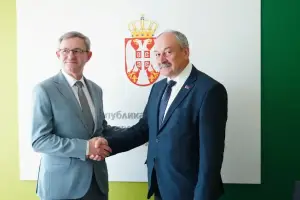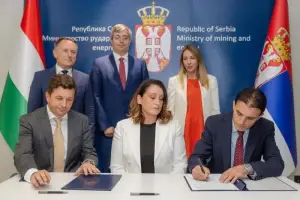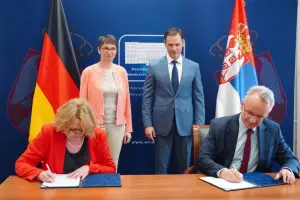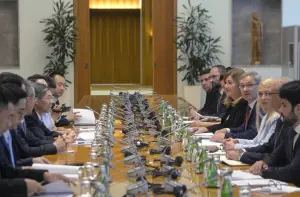- Serbia
Get to know Serbia
- Citizens
Culture and science
Health services
Pension and disability insurance
- Business
Employment
Economy
- Media
- Government
- Contact
Keep in touch
Contact form
Back
Keepin touch
Whether you have a question, comment, suggestion or any problem in the purview of the government, send us your message and we will try to respond as soon as possible. If your problem is not in our purview, we will forward your message to the relevant institution.
Q:
A:
Serbia will initiate negotiations on liberalisation of services during CEFTA presidency
Belgrade,
10 June 2010
State Secretary at the Ministry of Economy and Regional Development Vesna Arsic stated today that during its Central European Free Trade Agreement (CEFTA) presidency in 2010, Serbia will start negotiations on the liberalisation of services, which will help increase exports.
Addressing the press after a meeting of state secretaries and assistant ministers from CEFTA signatory countries, Arsic emphasised that negotiations on the liberalisation of services are expected to last from one to two years.
Serbia should take this opportunity because it has a lot to offer in the services sector to countries in the region, she noted.
Serbia’s goal is to ensure that an agreement is reached between CEFTA countries on the implementation of equal terms and conditions regarding public procurement and the harmonisation and standardisation of policies on trade competition and investment incentives and protection, explained Arsic.
Countries in the region have weathered the crisis better than developed countries, however, they still face the problem of a very slow recovery in demand, she observed.
She explained that the trade volume between countries in the region dropped by 25% last year and failed to recover in the first months of 2010, unlike in the rest of the world.
However, she noted that the 18% growth in Serbia’s overall exports in the first four months this year is of huge importance.
Serbia marks a surplus in trade with CEFТA members, of which 70% is trade in industrial products and 30% in agricultural ones, Arsic specified.
She recalled that Serbia has established a full liberalisation regime in trade with other CEFТA countries, except for Croatia, because quotas must be determined for certain products traded with this country.
The CEFТA agreement was signed in 2006. It referred to mutual liberalisation in trade in industrial and agricultural products between Serbia, Albania, Bosnia-Herzegovina, Bulgaria, Croatia, Macedonia, Moldova, Romania, Montenegro and UNMIK-Kosovo.
Since January 2007 Romania and Bulgaria are no longer CEFТA members because they joined the EU.
Serbia should take this opportunity because it has a lot to offer in the services sector to countries in the region, she noted.
Serbia’s goal is to ensure that an agreement is reached between CEFTA countries on the implementation of equal terms and conditions regarding public procurement and the harmonisation and standardisation of policies on trade competition and investment incentives and protection, explained Arsic.
Countries in the region have weathered the crisis better than developed countries, however, they still face the problem of a very slow recovery in demand, she observed.
She explained that the trade volume between countries in the region dropped by 25% last year and failed to recover in the first months of 2010, unlike in the rest of the world.
However, she noted that the 18% growth in Serbia’s overall exports in the first four months this year is of huge importance.
Serbia marks a surplus in trade with CEFТA members, of which 70% is trade in industrial products and 30% in agricultural ones, Arsic specified.
She recalled that Serbia has established a full liberalisation regime in trade with other CEFТA countries, except for Croatia, because quotas must be determined for certain products traded with this country.
The CEFТA agreement was signed in 2006. It referred to mutual liberalisation in trade in industrial and agricultural products between Serbia, Albania, Bosnia-Herzegovina, Bulgaria, Croatia, Macedonia, Moldova, Romania, Montenegro and UNMIK-Kosovo.
Since January 2007 Romania and Bulgaria are no longer CEFТA members because they joined the EU.
-
 Belgrade, 11 July 2025
Belgrade, 11 July 2025Potential for improving cooperation with Belarus in many areas
-
 Požega, 5 July 2025
Požega, 5 July 2025Section of Pakovraće - Požega highway officially opened
-
 Belgrade, 2 July 2025
Belgrade, 2 July 2025Technical specifications defined for Serbia-Hungary oil pipeline
-
 Belgrade, 30 June 2025
Belgrade, 30 June 2025IMF confirms Serbia successfully implementing all agreed reforms
-
 Belgrade, 27 June 2025
Belgrade, 27 June 2025Double Taxation Avoidance Agreement with Germany signed
-
 Kostolac, 25 June 2025
Kostolac, 25 June 2025Construction of Kostolac wind farm nearing completion
-
 Belgrade, 24 June 2025
Belgrade, 24 June 2025Government supports request for new postponement of sanctions against NIS
-
 Belgrade, 23 June 2025
Belgrade, 23 June 2025Procedures to facilitate sale of Serbian products to China to be accelerated
-
 Belgrade, 21 June 2025
Belgrade, 21 June 2025Serbia receives first funds under Growth Plan for the Western Balkans
-
 Belgrade/Cairo, 20 June 2025
Belgrade/Cairo, 20 June 2025New phase in relations with Egypt in field of agriculture
